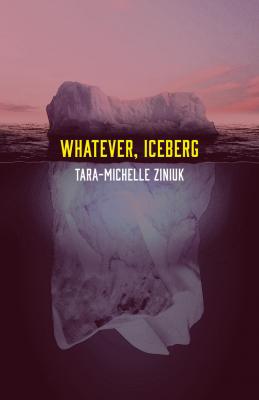Whatever, Iceberg chronicles an all-too-familiar queer romance interwoven with polyamory, single parenting, chronic pain, poverty, and aging. Despite the specificity of Ziniuk’s writing, the collection remains relatable for anyone who has ever been in a badly timed romance or burned by a lover.
If a collection of poems can be a page-turner, then Tara-Michelle Ziniuk’s third poetry collection, Whatever, Iceberg, is just that. Whatever, Iceberg chronicles an all-too-familiar queer romance interwoven with polyamory, single parenting, chronic pain, poverty, and aging. Despite the specificity of Ziniuk’s writing, the collection remains relatable for anyone who has ever been in a badly timed romance or burned by a lover. The book avoids narrow identity-based writing while still exploring themes that spill out of queer life.
In Whatever, Iceberg, Ziniuk evokes the undulating emotions of a lover who is made to feel secondary to another—more prioritized—romance. In “First Thursday,” Ziniuk describes feeling as a romantic placeholder: “You bring me temporary tattoos of roses when you return from your trip. / You tell me to close my eyes and apply one when I do. In another city, you partner / inks her arm in needles and blood. Outlines of roses rise from her pale skin. I won’t / know this until months later. My face flushes, / twice.” Ziniuk’s speaker feels cherished, and then embarrassed, after realizing another lover has been permanently marked while her own tattoo will wash away in a few days.
The knowledge that the relationship explored throughout Whatever, Iceberg will inevitably fail looms over the collection. Ziniuk offers the reader heartbreaking metaphors and snapshots laying out the slow crumbling of the love affair. Describing a moment of quiet intimacy, she gives us vivid images of the fragility and the tenderness between the speaker and her ex-lover: “Sun-bleached brown / wicker snapping between our fingers, / our fingers intertwined like wicker about to snap.”
Ziniuk uses the metaphor of an iceberg to describe many things, perhaps most strikingly the emotions of her ex-lover. The title of one poem, “I Have Never Been an Iceberg” could have been a back cover blurb for the book. Whatever, Iceberg is a beautiful, messy, insightful description of a lover who admits nothing about themselves, written by a lover who admits everything. Ziniuk captures the joy and frustration—diving into both physical and emotional pain—that comes with loving someone who is doing a terrible job at loving you back. She aptly displays the complexity of the situation as both deeply enticing and repellent. Ziniuk gives of the gift of a true response to false love.














